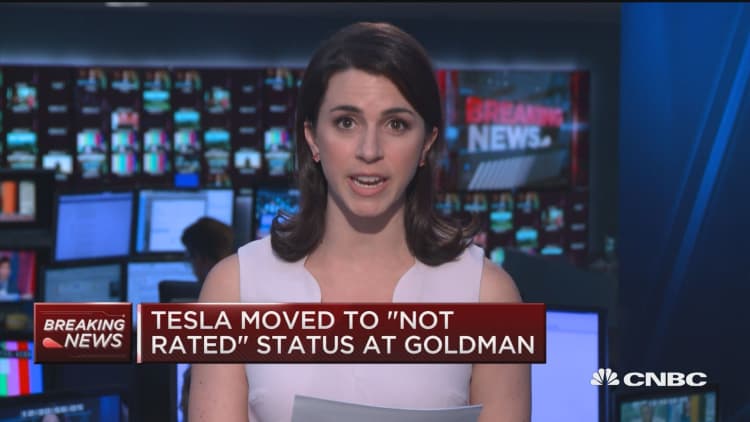There's another reason Tesla's faithful investors might want to scrutinize CEO Elon Musk's public musings on taking the company private: Shareholders would likely face a tax bill.
Musk's surprise announcement last week — which is under review for possible violations of securities laws, according to various published reports — included his hope to let shareholders remain invested in a special fund if the company were to go private. He also said he would offer $420 per share.
Musk reiterated in a blog post on Monday that he would want current shareholders to remain invested if they choose to. He also said the $420 price he floated would be for those who don't want to stay.
"My best estimate right now is that approximately two-thirds of shares owned by all current investors would roll over into a private Tesla," Musk wrote.
However, if that were done via a special fund as he initially said, shareholders likely would need to sell their Tesla shares and purchase fund shares.
"It would be like buying a mutual fund, only the fund only invests in one stock," said Bill Smith, managing director at CBIZ MHM's National Tax Office in Washington.
And for investors with profits from the sale of their shares, those gains would be taxed regardless of what they do with the money.
Short-term gains — shares held less than a year — are taxed as ordinary income. Long-term gains are those for shares that were held longer than that, and the rate is either zero percent, 15 percent or 20 percent, depending on your overall income.

Longtime Tesla shareholders could be on the hook for a big bill. In June 2010, Tesla went public with an opening share price of $19. Since then, its stock has climbed to $340 or so — and that's despite the company continuing to post losses. In 2017, Tesla had a reported a net loss of $2.24 billion, widening from $773 million in 2016.
Nevertheless, $10,000 invested in Tesla when it went public eight years ago would be worth close to $179,000 today. That gain of $169,000, taxed at the top rate of 20 percent, would generate a tax bill of $33,800. And depending on the investor's total adjusted income, an additional 3.8 percent tax could be due.
While there are company structures and accounting strategies that in theory can help shift shareholders from public to private without taking a tax hit, Tesla's size pretty much rules that out.
"For Tesla's size, it's highly unlikely," said JR Lanis, a partner at the Los Angeles office of national law firm Drinker Biddle. "If we were talking about a much smaller company, maybe."
More from Personal Finance:
Beyond the tax implications of staying invested with Tesla through a fund, investors should be aware of other issues.
For starters, it's unclear exactly how a special fund could be structured in a way that would allow all shareholders to stay if they want, despite Musk's hope.
"It's hard to do these types of big-dollar transactions under the best of circumstances," Lanis said. "If you bring in smaller investors, it's a coordination nightmare."
Generally speaking, private companies are allowed to have up to 2,000 regular shareholders without triggering SEC reporting requirements. If a fund were created, it could be a way to sidestep the limit.
However, in that case, experts say the investors would need to be accredited — meaning they need to have at least $1 million in investable assets excluding the value of their home or average yearly earnings of $200,000 ($300,000 for married couples).
It's hard to do these types of big-dollar transactions under the best of circumstances. If you bring in smaller investors, it's a coordination nightmare.JR LanisPartner, Drinker Biddle
In other words, that would remove the option to remain invested for anyone who could not meet those minimum requirements.
"The profile of the typical Tesla investor is someone who is wealthy and a young tech investor, who may or may not be accredited," said certified financial planner James Gambaccini, a managing partner at Acorn Financial Services in Reston, Virginia.
Even for those who could stick with the company, it would mean less flexibility in when you can buy or sell shares. Musk's email to employees said he envisioned allowing shareholders to buy or sell about every six months.
Additionally, there's a big difference between being invested in a public company — one whose stock trades on a U.S. stock exchange — and a private one.
Public companies must adhere to stricter reporting requirements, including filing quarterly financial statements that can be viewed by the public on the Securities and Exchange Commission's website. They also face prying questions from Wall Street analysts, whose reports can sway investor opinion.
Private companies, on the other hand, generally can avoid publicly sharing their financial information. That might be a bonus for the company itself due to reduced scrutiny, but it leaves investors with less ongoing information to base investment decisions on.


